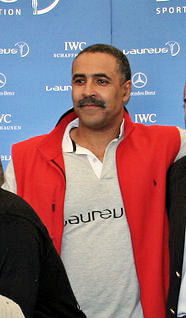A Quote by Thomas Huxley
Living things have no inertia, and tend to no equilibrium.
Quote Topics
Related Quotes
If you work hard in real life, people tend to get in your way - either from inertia or prejudice - and they stop you achieving things. It's the worst thing about real life compared with sports, where you generally get what you deserve: if you're the fastest guy, you win; there are no other games being played.
It had been held that the economic system, any capitalist system, found its equilibrium at full employment. Left to itself, it was thus that it came to rest. Idle men and idle plant were an aberration, a wholly temporary failing. Keynes showed that the modern economy could as well find its equilibrium with continuing, serious unemployment. Its perfectly normal tendency was to what economists have since come to call an underemployment equilibrium.





































